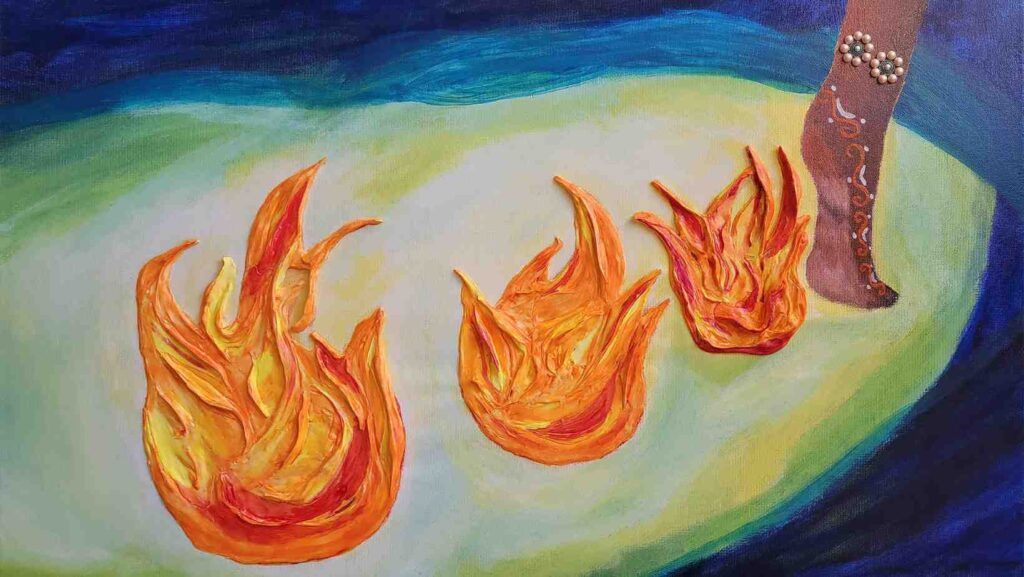by Niraj Shah from https://www.nirajshah.me/

One reason people procrastinate when it comes to challenging tasks is because of low self-esteem – believing that they cannot accomplish the goal they’ve been wanting to accomplish for a long time.
This post is related to one’s self-efficacy.
Improving self-efficacy and self-esteem are equally important in my evolution of painting journey.
Social cognitive psychologist, Albert Bandura, states that self-efficacy is “the belief in one’s capabilities to organize and execute the courses of action required to manage prospective situations.“
Self-efficacy is not the same as self-esteem.
Self-efficacy is about our own belief in our ability to succeed in different situations, while self-esteem refers to the impression we have of ourselves in regard to our own worth.
There is research showing the correlation between the 2, where high self-efficacy lends to high self-esteem and vice versa.
If you have low self-efficacy, you’ll most likely avoid the task and won’t set goals for yourself. Low confidence, low resilience, depression, and anxiety can take hold.
Like how most of our “self” is developed in our formative years, so is self-efficacy, but it can be developed.
As I said in the ‘About the Painting’ section for the Flame the Cave in Clay artwork, we can evolve into a new, better version of ourselves every day by learning something new from books, new experiences, learning new skills, etc.
As I asked in the ‘Self-Reflection’ section of Flame the Cave in Clay artwork,
If you have low self-efficacy:
What talents and/or skills do you need to evolve in order to develop higher self-efficacy so you can reach a goal you’ve been wanting to accomplish?
What steps can you take to develop these talents and skills?
Talents/Skills for Higher Self-Efficacy in Evolution of Painting
To develop higher self-efficacy in painting, one needs to identify and cultivate specific talents and skills. These include:
- Mindset is everything: maintaining a positive mindset is essential to success. When we believe in ourselves deeply, we are more likely to take risks, pursue our passions, and keep going even when things go tough.
- Artistic Perception: Understanding of color theory, composition, and the ability to perceive details in the environment that can inspire and inform your artwork.
- Technical Skills: Mastery of various painting techniques such as blending, layering, brushwork, and the use of different mediums (oil, acrylic, watercolor, etc.).
- Creative Thinking: The ability to think creatively and develop unique ideas for your paintings.
- Emotional Expression: Skills in expressing emotions and stories through your artwork.
- Critical Analysis: The ability to critique your own work and accept constructive criticism from others.
- Patience and Persistence: Painting requires patience and the persistence to complete a piece, even when it becomes challenging.
10 Steps to Develop These Talents and Skills
- Practice Regularly: Consistent practice is key in honing your painting skills. Set aside dedicated time each day or week for painting.
- Study Art Fundamentals: Enroll in art classes or online courses that teach the fundamentals of drawing, color theory, and composition.
- Experiment with Different Styles: Don’t be afraid to try different painting styles and techniques. This can help you find your unique voice as an artist.
- Seek Feedback: Share your work with others and be open to feedback. Constructive criticism can be a powerful tool for improvement.
- Learn from Masters: Study the work of renowned painters. Understand their techniques and the stories behind their art.
- Mindfulness and Reflection: Engage in mindfulness practices to enhance your emotional expression in your art. Reflect on your emotions and experiences and how they can be translated into your paintings.
- Set Realistic Goals: Set achievable goals for your art. This could be completing a painting every month or mastering a new technique each quarter.
- Build a Supportive Community: Join art communities, either online or locally. Interacting with fellow artists can provide motivation and inspiration.
- Document Your Progress: Keep a journal or portfolio of your work to track your progress. This can be motivating and informative to see how far you’ve come.
- Stay Inspired: Regularly visit art galleries, read art books, and immerse yourself in environments that inspire your creativity.
Leave your thoughts in the comments below, I would love to hear from you.